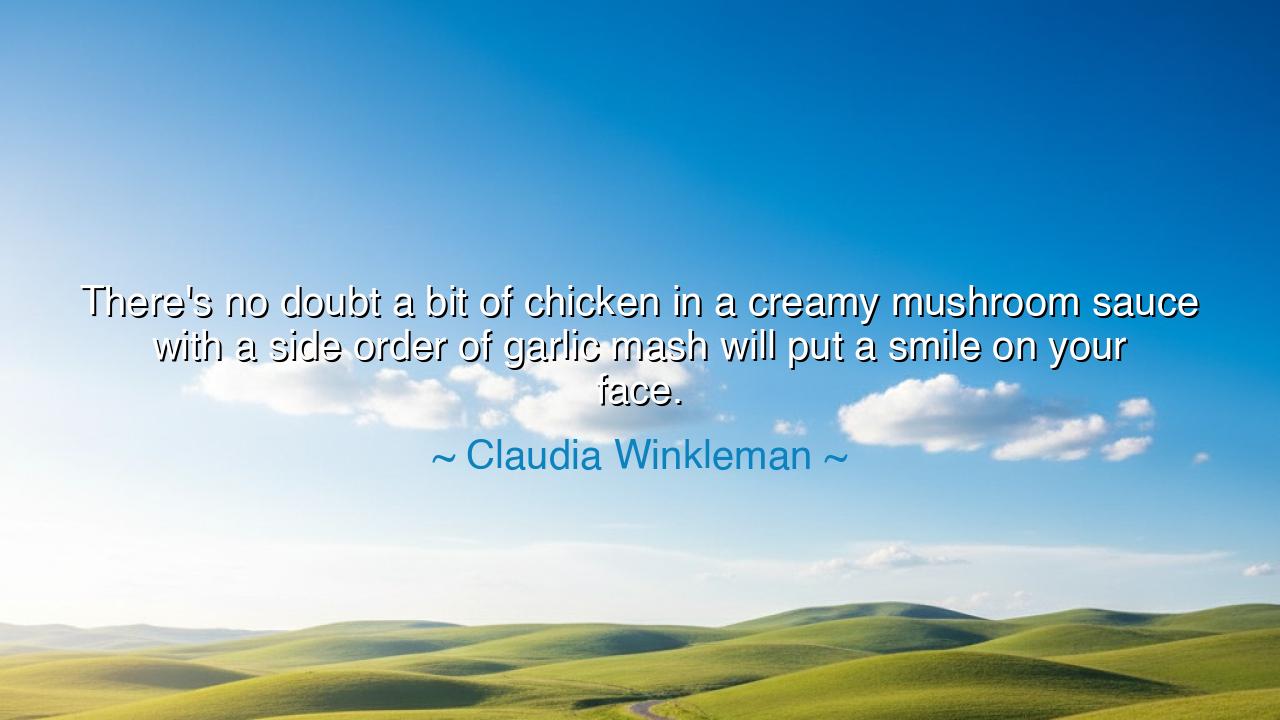
There's no doubt a bit of chicken in a creamy mushroom sauce with
There's no doubt a bit of chicken in a creamy mushroom sauce with a side order of garlic mash will put a smile on your face.






Claudia Winkleman, with her characteristic warmth and wit, once declared: “There’s no doubt a bit of chicken in a creamy mushroom sauce with a side order of garlic mash will put a smile on your face.” At first glance, these words speak of food, of comfort, of flavors mingling upon the tongue. Yet beneath the humor and lightness lies an ancient truth: that nourishment is not only of the body, but also of the spirit, and that the simple gifts of a meal well-made can bring a deeper joy than riches or crowns.
The ancients themselves revered such wisdom. To them, the feast was not mere indulgence, but sacred ritual. In Greece, banquets bound cities together; in Rome, shared bread and wine created alliances stronger than law. Even the humblest dishes, offered in fellowship, became symbols of unity and delight. Winkleman’s mention of chicken, mushroom sauce, and garlic mash is not idle—it is a reminder that comfort food, simple and honest, carries within it the power to lift burdens, to ease the weary heart, to draw forth a smile as surely as music or laughter.
History gives us many examples of this truth. Think of Franklin D. Roosevelt, who, in the darkest days of the Depression, would sometimes invite advisors and guests to the White House for meals not of extravagance, but of hearty simplicity. Those dinners, filled with conversation and the warmth of shared food, gave hope to men laboring under enormous weight. Just as Winkleman suggests, it was not grandeur but familiarity—the kind of meal that made one feel human again—that restored spirits and brought back the smile to tired faces.
The deeper meaning here is that joy often hides in the ordinary. In a world that clamors for wealth, spectacle, and glory, the heart may still be gladdened by a plate of garlic mash, steaming and rich, beside tender chicken bathed in sauce. This is no trivial pleasure; it is the body’s way of reminding us that contentment is found in small things, that delight is not always far-off or elusive. To find joy in such simplicity is a mark of wisdom, for it teaches us to savor what we already possess.
Mark this well: the smile Winkleman speaks of is more than physical. It is the smile of gratitude, of comfort, of being grounded in the present moment. When the senses are soothed, when the table is full, the soul remembers that life is not only toil and worry, but also flavor, laughter, and fellowship. In this way, the humble meal becomes a sacrament of joy, carrying with it the strength to face life’s greater battles.
Practical wisdom flows from this: do not wait for monumental events to grant you happiness. Instead, learn to embrace the small blessings—whether it is a well-cooked supper, a shared loaf, or the aroma of herbs and garlic rising from the pan. Cook for others when you can, for to serve food is to serve joy, and to eat together is to bind hearts more strongly than words. In such simple acts, you will find the smiles that make life rich.
Therefore, O seeker, let Claudia Winkleman’s lighthearted wisdom be your guide. Seek not always the rare and extraordinary; instead, cherish the warmth of a meal, the company of friends, the laughter around the table. For truly, as she says, a plate of chicken with mushroom sauce and garlic mash can put a smile on your face—and in that smile lies the reminder that life’s greatest treasures are often the simplest ones.






AAdministratorAdministrator
Welcome, honored guests. Please leave a comment, we will respond soon